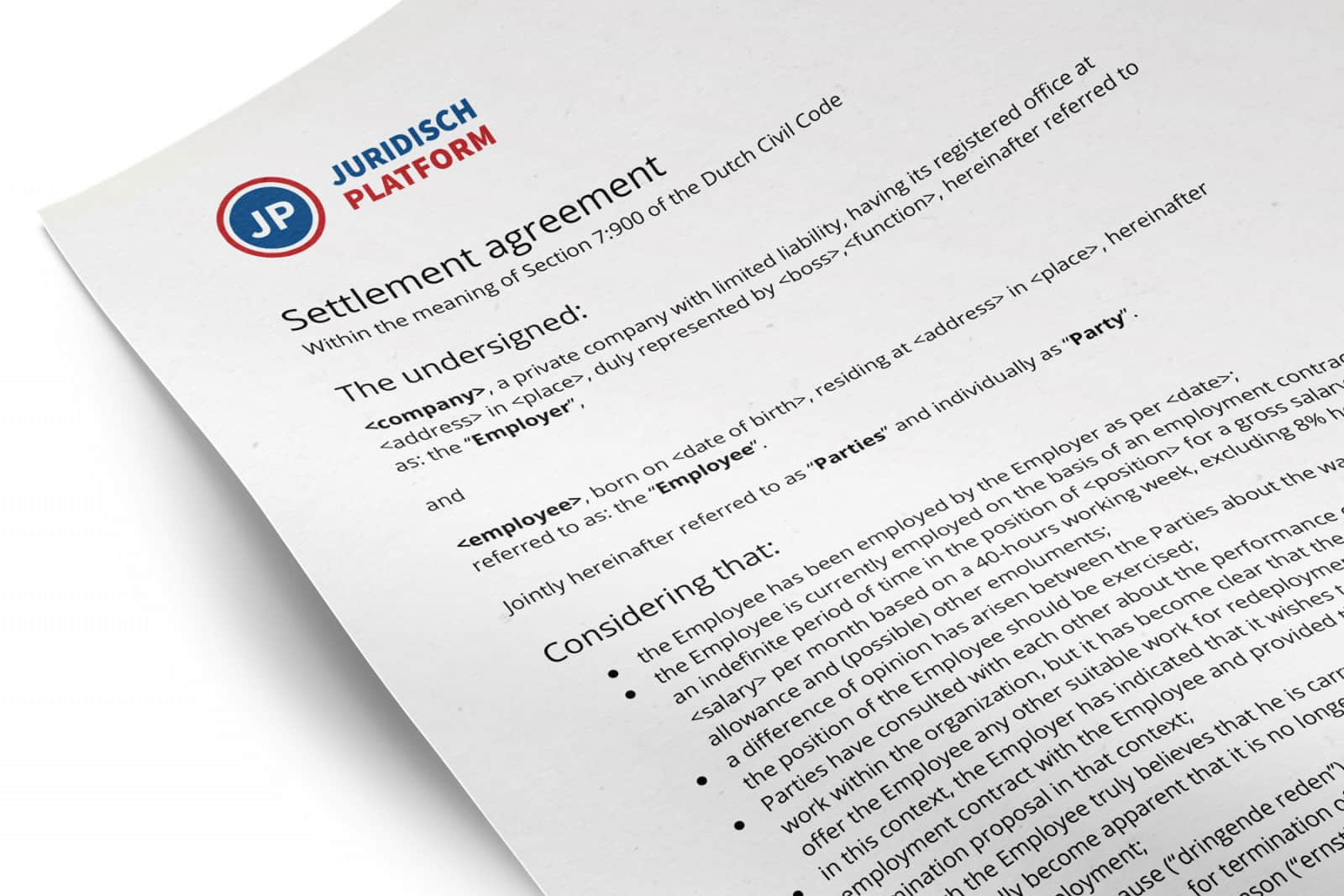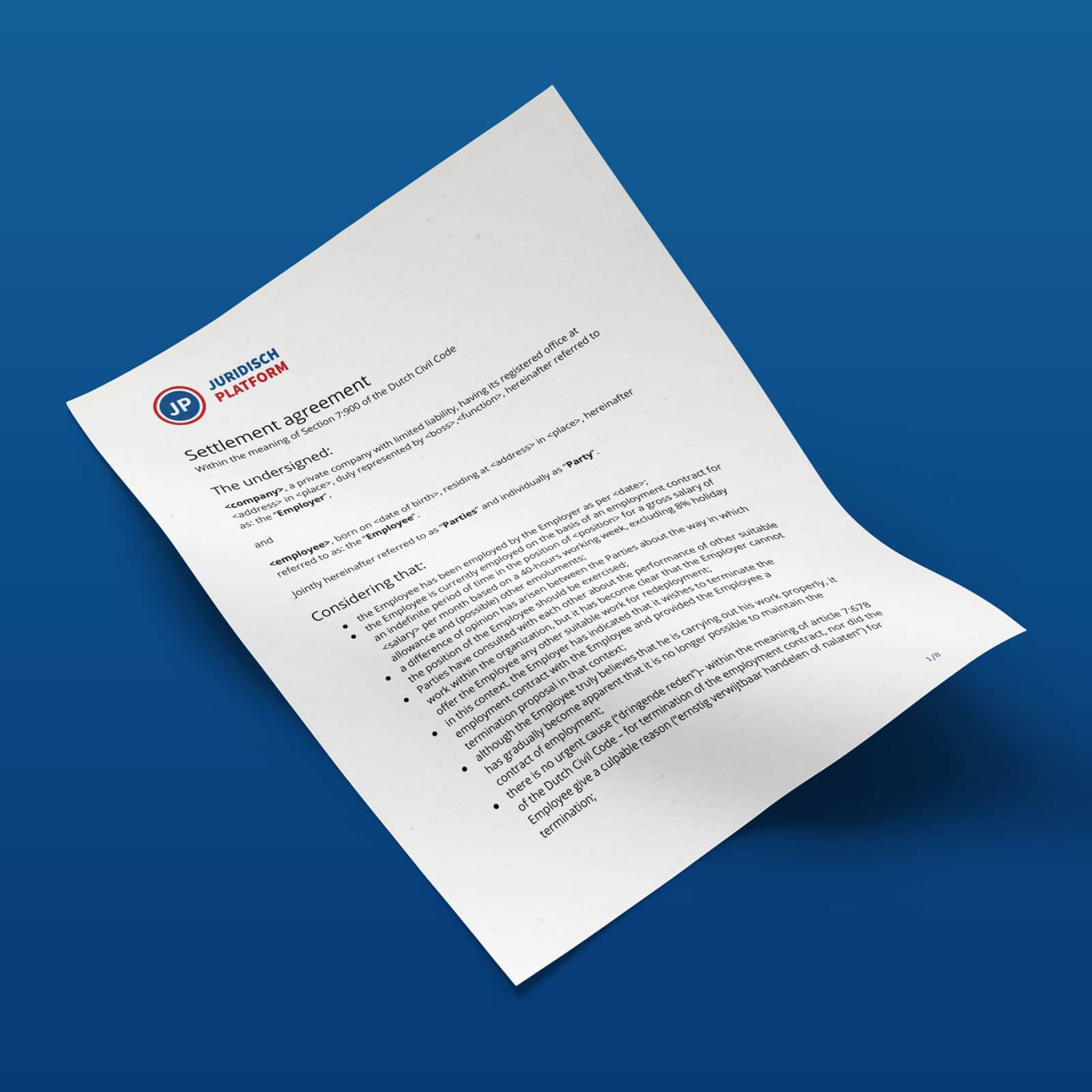Settlement agreement at dismissal

If your Dutch employer wants to fire you, you may be offered a settlement agreement. This document is used to record the conditions of your dismissal in writing. What does it contain and can you negotiate about a better proposal?
What is a settlement agreement?
A settlement agreement (vaststellingsovereenkomst) is a written agreement in which the conditions regarding the termination of your employment contract are recorded. In The Netherlands a settlement agreement can be used in the event of dismissal by mutual consent (ontslag met wederzijds goedvinden). The dismissal conditions laid down in a settlement agreement should meet both your wishes and those of your employer. Once you and your employer have signed the settlement agreement, your employment contract can legally be terminated.
Synonyms for settlement agreement
It might be a bit confusing when you are looking at a dismissal proposal that has a slightly different name. The terms severance package, final settlement, mutual agreement, termination proposal (beëindigingsvoorstel), termination agreement (beëindigingsovereenkomst) or termination employment contract are also being used. Legally speaking, they all indicate a settlement agreement and contain the same clauses.
When use a settlement agreement?
It might take some time to get used to a new job, a different language and your new employer. But a lot of expats or people who work for a Dutch employer feel completely at home at some point. In some occasions though, there is just no fit. This might be due to your tasks, business circumstances (bedrijfseconomische omstandigheden), the working ethos or the relationship with your new boss. Conflict of characters or a serious event in the workplace might stir up friction. But what can your employer do when he or she intends to fire you without a clear indication or reason to do so?
No apparent reason for dismissal
If there is no valid reason for dismissal (gegronde ontslagreden) or your personnel file is inconclusive, an employer often tries to avoid a dismissal process through the Employment Insurance Agency (ontslag via het UWV) or the subdistrict court (ontslag via de kantonrechter). These dismissal procedures require a clear dismissal reason, a better preparation, they take longer, are more expensive and the outcome is uncertain. If you are still 'on speaking terms', dismissal by mutual consent (ontslag met wederzijds goedvinden) is the obvious way forward. And that requires the use of a settlement agreement.
Conditions in a settlement agreement
A settlement agreement contains the conditions you agree upon with your employer regarding your dismissal. According to the Dutch government, a legally binding settlement agreement must record the following information in any case.
Mandatory conditions settlement
A settlement agreement must contain the name and address of you and your employer.
It must be clear that your employer proposed to terminate your contract (initiatief aan zijde werkgever). Without it, you could loose your unemployment benefits (WW-uitkering) if the Employee Insurance Agency (UWV) if of the opinion that you are responsible for your dismissal.
A settlement agreement must contain a dismissal ground (ontslagreden). Dismissal reasons that are not allowed to be terminated by settlement agreement are 'urgent reasons', 'business circumstances' and 'long-term illness'.
If there is an urgent reason for dismissal, your employer will probably try to fire you on the spot. Immediate dismissal (ontslag op staande voet) is only allowed if your employer complies with certain rules. Examples of urgent reasons are deceit, theft, fraud, abuse or refusal to work.
It must be mentioned that the settlement agreement has been drafted to execute dismissal by mutual consent (ontslag met wederzijds goedvinden).
A settlement agreement must contain the termination date of your employment contract (einddatum dienstverband). Make sure you apply your notice period (opzegtermijn) correctly. If applied wrong, you could loose (or get cut on) your unemployment benefits.
To prevent loose ends, it's necessary to include a final settlement date. This ensures you that your employer can make arrangement to pay out your wages, holiday allowance, outstanding holidays and any bonuses.
From signing, there is a statutory reflection period (wettelijke bedenktermijn) of two weeks (14 days) in which you can revoke the settlement agreement. If your employer leaves this clause out, your reflection period increases to three weeks (21 days).
A settlement agreement must contain the dates when and locations where you and your employer have signed.
Your employer can add additional conditions to the (draft) settlement agreement. But so can you! It is common practise to negotiate about them. Dutch labor law doesn't oblige you to sign any proposal you don't agree with, so we suggest you make good use of it. Voluntary conditions we often see are summed up below. You can click on the term to read more about it.
Voluntary conditions settlement
Garden leave
In most cases a garden leave (or gardening leave) is part of a settlement agreement. In Dutch this literally translates to 'tuiniersverlof', but we actually use vrijstelling van werkzaamheden. It is no disciplinary measure, but used to maintain order in case of reorganization or excess staff. You could negotiate about it, if you are willing to stop working anyway.
Transition payment
If your employer dismisses you or doesn't extend your contract, you are obliged to a statutory severance payment. It is known as a transition payment or transitional remuneration (transitievergoeding). The only catch is, it doesn't apply to dismissal by mutual consent. You can however negotiate about a suitable severance payment.
Severance payment
Although you are legally not entitled to a transition payment (transitievergoeding) with dismissal by mutual consent, you can however negotiate about a suitable severance payment (ontslagvergoeding). Especially when your employer lacks a valid reason for dismissal or doesn't have a proper personnel file, there is room to negotiate.
Outplacement compensation
Here too, an employer would usually cover or compensate the cost for outplacement or education by paying you a transitional payment. Although you are legally not entitled to a transition payment (transitievergoeding) with dismissal by mutual consent, you can however negotiate about a suitable outplacement compensation if applicable. Especially when your employer lacks a valid reason for dismissal or doesn't have a proper personnel file, there is room to negotiate.
Outstanding holidays
Your Dutch employer must comply with the statutory regulations regarding holiday entitlement. These regulations state that employees are entitled to a minimum number of paid holidays (statutory leave). If you are dismissed by mutual consent, you can negotiate about any outstanding holidays (openstaande vakantiedagen). You could choose to keep working until your termination date and have them paid out. But it might be more attractive to take those days and quit your job sooner.
Non-competition clause
Your employer will use a non-competition (concurrentiebeding) clause to protect its business interests. On the other hand, as an employee you must also be able to continue working at another company if you are fired or resign yourself. If you negotiate about the dismissal properly, the non-competition clause will generally be toned down or even canceled. An experienced labor lawyer can assist you with this.
Handing in company properties
Don't be too quick to hand over your car, computer or telephone, because as long as you are employed you will need them to perform your job. You might be able to negotiate about the date you have to hand them in. That could give you time to look for a new car or laptop.
We don't advise you to draft a settlement agreement yourself. It is smarter to let your employer come up with a first proposal. If you are curious to see what a settlement agreement for a Dutch company looks like, you can download an example in English below.
Download settlement agreement example
Do you want to know what a settlement agreement looks like that complies with Dutch labor law? You can download a free example here in English.
Download example
Improve your settlement agreement
It might not instantly appear so, but it is very common to negotiate about the contents of your settlement agreement. If your employer lacks a valid dismissal reason or has a weak personnel file, your legal position is strong.
In this video mr. Jos de Ridder (labor lawyer and owner of Juridisch Platform) talks about the questions employees usually have when they are presented with a settlement agreement. It is in Dutch, but you can turn on English subtitles.
Check your settlement agreement
To ensure that your settlement agreement is drawn up fairly, that you will receive a realistic severance payment and you are entitled to (subsequent) unemployment benefits, it is wise to seek advice from an independent labor lawyer. We can tell you exactly what to look out for and ensure you that you will part under the most favorable conditions possible.
Check my agreement (free)Settlement agreement questions
Most employees that receive a (draft) settlement agreement, are inundated with questions. We have included the frequently asked questions below and provided them with answers.
Should I accept the first settlement offer?
No, it's generally a bad idea to accept the first settlement offer from your employer. Always have a labour lawyer check your legal position to make sure your unemployment benefits (WW-uitkering) are secured and you've maximised your severance payment (ontslagvergoeding). We advice you for free.
What is a fair settlement agreement?
When your employer uses a settlement agreement (vaststellingsovereenkomst) for your dismissal, he has to make sure it is fair. He has to apply by the rules of the transitional remuneration (transitievergoeding) for instance. If the outcome seems unfair to you, do negotiate for better terms.
How do you negotiate a settlement agreement?
A successful negotiation about a settlement agreement strikes the balance between the carrot and the stick. For everything you want, you need to offer something in return. Your bargaining position is stronger if your employer doesn't have a solid dismissal ground or lacks a proper dismissal file (ontslagdossier).
Should I accept a settlement agreement?
In general you should only accept a settlement agreement that is fair. Your legal position plays a part in determining the fairness of the settlement. Your bargaining position improves if your employer doesn't have proper dismissal ground or dismissal file. Always let a lawyer check your agreement before accepting.
Is a settlement agreement the same as redundancy?
A settlement agreement is often used in a redundancy situation, but it isn't the same thing. Dismissal due to redundancy is defined by law and should follow a fair redundancy procedure. By using a settlement agreement instead, both parties win in terms of money and time.
How much should I ask for a fair settlement?
In most dismissal cases you are entitled to a transitional remuneration (transitievergoeding). If your bargaining situation is good and the remuneration amount seems unfair, you can negotiate about a higher severance payment (ontslagvergoeding). Start asking for 75 to 100 percent more than you would be satisfied with.
What happens if I don't accept a settlement?
If you reject the settlement offers from your employer, your employment stays intact. In most cases this forces your employer to start an official dismissal procedure. The dismissal ground determines wether this should run via the UWV or a subdistrict court. Discuss the best strategy with our lawyers.
Free legal advice about dismissal
Fill our the form below, so one of our labor lawyers can call you about your (intended) dismissal. We will discuss one-sided clauses, missing parts and room for negotiation. That is free of charge!